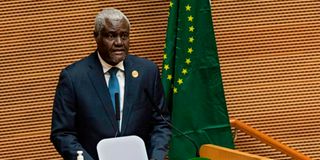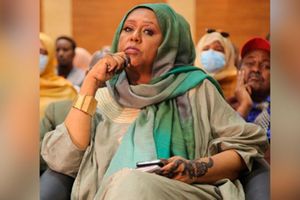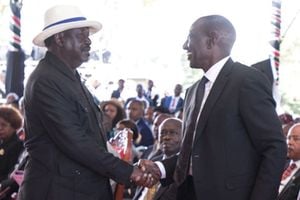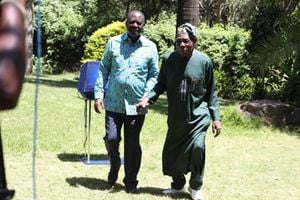
African Union Commission (AUC) Chairperson Moussa Faki Mahamat speaks during the 35th Ordinary Session of the African Union (AU) Summit in Addis Ababa, Ethiopia, on February 5, 2022.
Opposition leader Raila Odinga wants the top seat on the African Union Commission. And he also wants to remain a vibrant politician in the country, leading his Orange Democratic Movement (ODM) to greater heights.
On Wednesday, he told a rally in Homa Bay that he was not going anywhere, especially with Addis Ababa, the seat of the African Union, just a stone's throw away. Mr Odinga may have used the opportunity to manage the expectations of his supporters. But can he have it both ways?
That is debatable. To know his true intentions, we may have to wait until he wins. The election is scheduled for February next year.
In general, the chairperson of the African Union Commission is a very busy man, jumping on planes to address a coup here or a trade meeting there. He is also constantly managing the staff of a large organisation and speaking on behalf of 55 countries. That undermines his argument that the job doesn't take up much of his time.
There is another thing. The African Union in general promotes diversity of ideas, race, culture and political views. Except that staff can't express their own in public. The chairperson is allowed to exercise his civil rights, but he cannot engage in any activity that is incompatible with the impartiality required of staff or that may be prejudicial to the interests of the AU.
The details of this code of conduct are contained in the African Union Staff Regulations and Rules, which were drafted in 2010 but have been frequently amended to include new aspects of staff duties, responsibilities, rights and other issues.
Regulation: 4.2.3, for example, states that staff members shall not stand for elective political office in any state while in active service with the Union. They shall resign from the service of the Union. This applies mainly to permanent staff, including members of the African Union Commission.
Staff members shall also not engage in any continuous or recurrent occupation, profession or activity of any kind "which is incompatible with these rules or with the proper discharge of their official duties or which is incompatible with their status as international civil servants".
Well, as a party leader he could argue that he is not a full employee of the ODM, but the activities of the ODM, including the potential to clash with the government of the day on policy, could put him on a collision course with AU policy.
The AU is also critical of conflicts of interest and advises all staff to "refrain from the public display of interests and activities relating to partisan politics, religious matters or personal beliefs that are inconsistent with the philosophy, mandate and mission of the Union".
One more thing: while the support of individual member states is useful to help him win, once he is there he cannot do favours or take instructions from any country.
Regulation 3.3 states that "in the performance of their duties, staff shall neither seek nor accept instructions from the government of any Member State or from any other authority or source external to the Union".
In fact, this is often the oath of office for new Commissioners. They must pledge "to discharge the functions and responsibilities entrusted to me as an international civil servant of the African Union and to perform my duties and regulate my conduct solely with the interests of the Union in mind, and not to seek or accept instructions from the government of any Member State or from any other authority or source external to the Union".
However, staff members may form and join non-profit-making and non-political associations, unions or other groupings "for the pursuit of common objectives, provided that they do not compromise their position as international civil servants or conflict with the objectives of the Union".
They are not allowed to have other jobs, but may be allowed to teach at the university, do research or other work that may also enhance the image of the AU. However, if they patent or discover something in the course of their official duties, the copyright belongs to the AU.
If these rules are broken, the Assembly can dismiss a chairperson. However, this has never happened in the history of the African Union.










